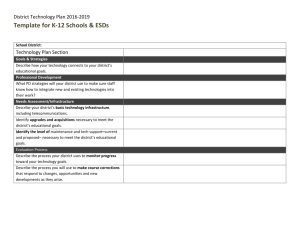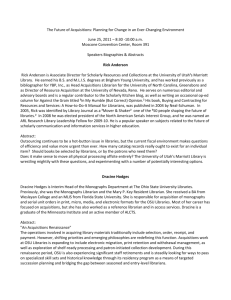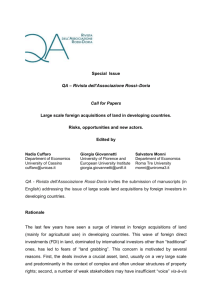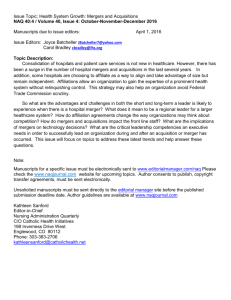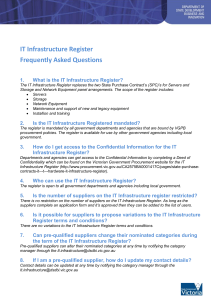university of johannesburg
advertisement
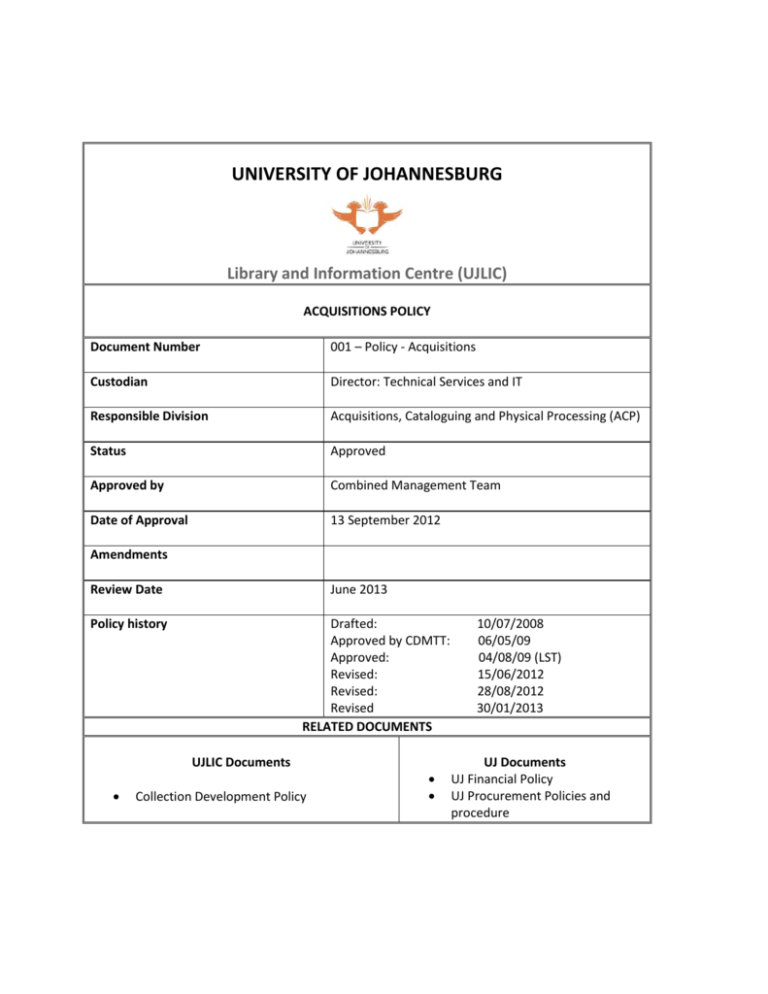
UNIVERSITY OF JOHANNESBURG Library and Information Centre (UJLIC) ACQUISITIONS POLICY Document Number 001 – Policy - Acquisitions Custodian Director: Technical Services and IT Responsible Division Acquisitions, Cataloguing and Physical Processing (ACP) Status Approved Approved by Combined Management Team Date of Approval 13 September 2012 Amendments Review Date June 2013 Policy history Revised: Drafted: Approved by CDMTT: Approved: Revised: Revised: Revised RELATED DOCUMENTS UJLIC Documents Collection Development Policy 10/07/2008 06/05/09 04/08/09 (LST) 15/06/2012 28/08/2012 30/01/2013 UJ Documents UJ Financial Policy UJ Procurement Policies and procedure LIBRARY AND INFORMATION CENTRE ACQUISITIONS POLICY CONTENT 1 Definitions Page 3 2 Overview 5 1. Budget 5 2. Suppliers and consortia participation 7 3. Pre-Cataloguing 8 4. Bibliographic and price verification 8 5. Quotations 8 6. Placing orders 9 7. Receiving 9 8. Subscription evaluation 10 9. Exhibitions 10 10. Management information 11 Acquisitions Policy Page 2 1 DEFINITIONS 1.1 ACP Acquisitions Cataloguing and Physical Processing 1.2 Acquisitions The process of ordering and receiving materials for the library by purchasing in a timely, accurate and cost effective manner. 1.3 Aggregator An electronic content provider that aggregates specific information published by various publishers into a single database. Aggregators provide electronic access to the data after it has been converted, online via the Internet, using proprietary software. 1.4 Appropriation Budget allocation for current year plus outstanding orders from the previous year. 1.6 Consortium A Consortium is an association of independent libraries, established by formal agreement, for the purpose of resource sharing. Membership may be restricted to a specific geographic region, type of library or subject specialization. 1.7 Departmental copy Information resources ordered for use solely in the department, from a departmental cost center. 1.8 Departmental representatives Departmental representative refers to the authorized signatory for the department. 1.9 Electronic Resources Electronic resources refers to a large, regularly updated file of digitized information (bibliographic records, abstracts, full text documents, directory entries, images, statistics, etc.) related to a specific subject or field, consisting of records of uniform format, organized for ease and speed of search and retrieval and managed with the aid of database management systems (DBMS) software. 1.10 Encumbrances Orders placed on the Integrated Library Management System (ILMS) and not yet received. 1.11 Expenditure Payment of goods received. 1.12 Faculty Librarians Information Librarians responsible for the coordination of all library services to a specific faculty. 1.13 Free balance Free balance = Appropriation – (Actual expenditure + Encumbrances) 1.14 FTE Full Time Student Equivalent Acquisitions Policy Page 3 1.15 ILMS Integrated Library Management System 1.16 MEC Management Executive Committee 1.17 SANLIC (South African National Library and Information Consortium) The Consortium’s role is to establish needs, negotiate licenses and prices with publishers and coordinate access, as well as provide guidelines for libraries that will assist in selecting and purchasing of high quality electronic full text databases. 1.18 Serial A serial publication has its own distinctive title, containing a mix of articles, editorials, reviews, columns, short stories, poems or other short works and is written by more than one contributor. A serial is issued in soft cover at regular intervals (weekly, monthly, etc.) Although each issue is complete in itself, its relationship to preceding issues is indicated by enumeration (issue, volume number and date) printed on the front cover. Content is controlled by an editor or editorial board. Serials are published by scholarly societies, university presses, trade and professional associations, government agencies, commercial publishers and non-profit organizations. Single serial titles, in an electronic format (whether born digital or digitized) are regarded as serials and not electronic resources. 1.19 Sole suppliers A sole supplier is a company or publisher who has exclusive rights in selling a product or service. Some information is only obtainable from dedicated suppliers or publishers. Electronic data bases form the biggest portion of sole suppliers. 1.20 Supplier Refers to the approved suppliers listed on the UJ Procurement Supplier Database. 1.21 UJLIC University of Johannesburg Library and Information Centre 2 OVERVIEW The Acquisitions Policy provides a framework for the procurement of all information resources. The Policy supports the vision and mission of the UJ Library and Information Centre of building and maintaining a collection of information sources essential to the support of teaching, learning and research at the University. This policy is based on standards of acquiring new information resources in the most timely, accurate and cost effective manner, following sound business and accounting practices. The Manager and Staff of Acquisitions, Cataloguing and Physical Processes (ACP), in conjunction with all other LIC Departments, determine the Policy on matters relating to acquisitioning of information resources. The final Policy is approved by the library management. This Policy is subject to annual review. Acquisitions Policy Page 4 3 INFORMATION BUDGET 3.1 Information Budget Allocation 3.1.1 The UJ Library and Information Centre receive an annual allocation for the Information Budget from the Management Executive Committee (MEC) and distribute it as follows: a) A portion from the budget is allocated for library related resources e.g. multidisciplinary databases and library search tools. b) A second portion of the budget is allocated to each Campus Library for filling gaps in the collections. c) The balance is allocated to Faculties/Departments. This is calculated using a formula (Stoop formula) which covers full time student equivalent (FTE’s), Teaching Input Units and Research Output Units. This formula will be revisited annually in November. 1.1.2 These amounts are allocated annually, in December once the library has received funding from the MEC/University. 3.2 Information Budget Expenditure 3.2.1 Faculties/Departments are responsible for the expenditure of their own budgets in collaboration with Faculty Librarians and Acquisitions, Cataloguing and Physical Processing (ACP) staff. ACP provides Faculties/Departments with committed amounts for subscriptions (commitments) to manage the expenditure of their budget allocation in a responsible manner. 3.2.2 Faculties/Departments are encouraged to spend their entire information budget allocation and to spread the expenditure as follows: a) a third of the budget by the end of April; b) another third by the end of July; c) 100% by the end of September. 3.2.3 Should these deadlines not be adhered to the unspent balances at the end of each quarter will be redistributed to the Faculty Librarians for the discretionary purchasing of relevant resources from the faculty “wish list”. 3.2.4 No funds may be transferred in the Integrated Library Management System (ILMS) or Oracle once allocated to a Faculty/Department. 3.3 Information Budget Reports and Forecasting 3.3.1 Acquisitions staff uses the ILMS (accounting report) to monitor the budget expenditure on a daily basis. 3.3.2 Monthly expenditure reports are sent by ACP to the Faculty Librarians who will forward it to Deans of Faculties and Departmental representatives for the information of the respective departments. 3.3.3 These reports will include: a) the status of the budget, (appropriation, expenditure, encumbrances, free balance and % spent) b) orders placed within the month Acquisitions Policy Page 5 c) orders received within the month d) orders cancelled within the month e) spreadsheets with detailed information, as well as a budget forecasting report, to meet the above deadlines f) Oracle information budget reports 3.4 Rules Governing Information Budget Expenditure. 3.4.1 Single copies of prescribed books are normally purchased. 3.4.2 Duplicate/multiple copies of prescribed books are only purchased if warranted by high demand of existing copies. The UJLIC will purchase up to a maximum of five books and two subscription copies from the Information Budget. 3.4.3 Should more than five copies be required, the department will be responsible for purchasing these from a departmental cost center, via ACP. 3.4.4 Replacement copies for lost and missing items will be ordered on recommendation of the Campus Librarians and Faculty Librarians. Campus Library information budgets will be used for the replacements 3.4.5 Requests to order prescribed items must reach the Acquisitions section of the UJLIC by a predetermined date a) Items needed for the first semester of any given year should be bought/ordered during September of the previous year. b) Items needed for the second semester of any given year should be bought/ordered before the end of March 3.5 Electronic sources 3.5.1 Acquisition of electronic sources will receive preference as this will increase access across campuses as well as remote access. 3.5.2 Print material will only be ordered if no electronic copy is available, or if the electronic format does not meet requirements. 3.5.3 Exceptions will be made for rare books and Africana, where the printed copy will be purchased. Written requests must be forwarded to the Manager: ACP. 3.6 Departmental Purchases 3.6.1 Departments may place orders from their departmental entities or research funds. These orders will be placed by the UJLIC. If the selector is prepared to pay the tax implications he/she may retain the book. If not, the item will be included in the library collection in the normal way. Block loans can be negotiated. Acquisitions Policy Page 6 4 SUPPLIERS AND CONSORTIUM PARTICIPATION 4.1 Suppliers 4.1.1 Advertisements inviting suppliers to be considered for registration on the supplier database of UJLIC will be placed annually during September. 4.1.2 Applications for approved supplier status should be submitted to the UJ Procurement Suppliers Evaluator on the prescribed form. 4.1.3 Supplier’s submissions are evaluated to ensure that there is compliance to UJLICs requirements. 4.1.4 An evaluation session will be scheduled between Acquisition staff and relevant stakeholders for a final evaluation of recommended suppliers to be placed on the approved supplier database by Acquisitions department each year. 4.1.5 Service Level Agreements are drawn up with each approved supplier and used in the abovementioned evaluation by Acquisitions department each year. 4.1.6 Should a Supplier not meet service level standards the UJLIC may recommend that they be removed from the Supplier Database. 4.2 Consortia 4.2.1 The UJLIC actively pursues co-operative agreements and consortia arrangements with other libraries and library organizations to improve access to information sources at the best prices. 4.3 Electronic databases and eResources from sole suppliers 4.3.1 Many of the eResources and electronic databases cannot be acquired via quotations as they are available only from dedicated or sole suppliers. The cost of these resources necessitates extra ordinary procedures in order to be compliant with the procurement policy. PRE-CATALOGUING 5 5.1 All Acquisitions staff is responsible for downloading/creating of pre-cataloguing bibliographic records to attach to order records. 6 BIBLIOGRAPHIC VERIFICATION 6.1 Information on order requisition forms is verified by Acquisition staff using bibliographic and other databases to ensure that all information is complete and accurate before placing an order. 6.2 Holdings control is done on the ILMS to determine whether the library already owns a copy of the item, in order to eliminate duplicate orders. 6.3 Orders identified as “out of print”, “not yet published”, “already in stock”, etc. will automatically be returned to departments with a reason for not ordering. Acquisitions Policy Page 7 6.4 If the department requires an additional copy it should be clearly stated on the order form. 7 QUOTATIONS 7.1 The Team Leader: Acquisitions requests quotations for specific titles from relevant approved suppliers (local and international). 7.2 A response is required within five working days. 7.3 Late submissions will not be considered. 7.4 The Team Leader: Acquisitions allocates the order to a supplier based on the best price offered. 7.5 Orders will be allocated to suppliers according to their area of specialization, pricing and p service delivery record and standard. 8 PLACING ORDERS 8.1 Faculties/Departments must submit order cards duly signed by the Departmental Representative. Suppliers are not permitted to complete order cards. 8.2 Placing an order with a supplier in the name of UJLIC is a legally binding agreement. 8.3 It is the responsibility of the Team Leader: Acquisitions to ensure that the separation of duties or division of work is adhered to by the Acquisitions staff to ensure compliance to audit requirements. 8.4 All official UJLIC orders have a unique ILMS generated order number. Suppliers should not fulfill any UJLIC order without the official order number as the item will not be accepted or paid for if an official UJLIC order number is not provided. 8.5 The Team Leader: Acquisitions will be responsible to verify approved quotations against orders placed on the ILMS before final orders are sent to approved suppliers. All orders are sent to the suppliers electronically (EDI or E-mail). 8.6 Orders are placed on the ILMS by date received. 8.7 The Acquisitions department may not purchase any items for a UJ Staff member for personal use. 8.9 Orders must be delivered within six to eight weeks of placement of the order. In exceptional cases (e.g. not yet in print) orders will be kept for a maximum of one year, after which it will be cancelled and the department informed accordingly. 8.10 Acquisition staff members interact with designated suppliers on an on-going basis and relevant stakeholders are kept informed of developments, e.g. title changes, ceased titles, claims, etc. 8.11 Complimentary/ Review copies will not be requested by Acquisitions staff. Acquisitions Policy Page 8 9 RECEIVING 9.1 All Acquisitions staff members receive information sources. 9.2 No orders will be received by the Acquisition staff member who originally placed the order. 9.3 Parcels are received, chronologically by date. 9.4 Acquisition staff members approve the invoice, ensuring the items on the invoice correspond with the items in hand and are reconciled against the order. 9.5 Invoices are entered in the Invoice Book, signed and dated by the acquisitions staff member assigned to the supplier. 9.6 Invoices are collected by the Library Assistant: Acquisitions to be submitted for payment. 9.7 Loose-leaf and ring-bound publications are sent for binding prior to being catalogued. 9.8 All license agreements are stored electronically on the Electronic Resource Management system. 10 SUBSCRIPTION EVALUATION 10.1 All subscriptions (print, electronic and databases) are evaluated annually during August), in conjunction with Faculty Librarians and Faculties/Departments. 10.2 Cancellations and renewals, as recommended by the Faculty Librarians and Faculties/Departments, are confirmed with the suppliers three months before the expiry date of the subscription. (September, or in exceptional cases on an alternative date). 10.3 Cancellation will be considered for the following reasons: a) Resource no longer meets academic or teaching requirements. b) Low usage statistics. c) IT specifications (electronic resources) are no longer compliant. d) The resource is available in a more accessible format. 11 EXHIBITIONS 11.1 An exhibition will be held annually where all approved Library suppliers will be invited to exhibit. 11.2 The exhibition will be organized by ACP with the collaboration of Campus Librarians and Faculty Librarians. 11.3 Faculty Librarians will be responsible for submitting requirements to suppliers (gaps in the collection, new courses, etc.). 11.4 Exhibition order requisitions must reach the Acquisitions Section/ACP within 7 days of the exhibition date. Acquisitions Policy Page 9 11.5 Acquisitions staff will order these publications within 14 days of receipt of the order requisition forms. 12 MANAGEMENT INFORMATION 12.1 Statistical and progress reports are submitted to the Manager: ACP on a monthly basis. Acquisitions Policy Page 10

